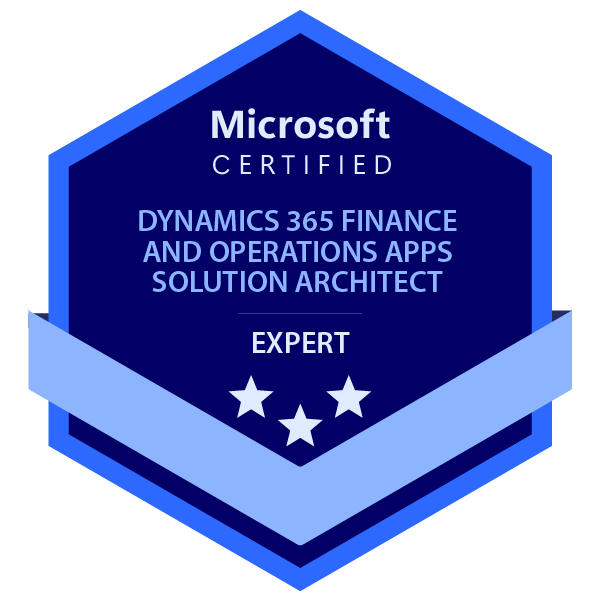Dynamics 365 Finance and Operations Apps Solution Architect Expert
2 – 3 weeks
Flexible Schedule

Summary of the Curriculum
Lead digital transformation initiatives with confidence through our Dynamics 365 Finance and Operations Apps Solution Architect Expert Course—designed to prepare senior professionals for the MB-700 certification and complex enterprise implementations.
At Acquledge, we equip solution architects with the strategic skills to analyze business requirements, define end-to-end solution blueprints, and oversee implementations across finance, supply chain, and operations. You’ll gain expertise in applying the Success by Design framework, crafting architecture that integrates Dynamics 365, Power Platform, Azure, and third-party systems, while ensuring security, compliance, and performance optimization.
This course also covers data and integration strategies, environment management, testing (RSAT), and industry-specific tailoring for verticals like manufacturing and retail. Whether you’re advising stakeholders, leading cross-functional teams, or designing scalable enterprise solutions, this expert-level course gives you the architectural mindset and practical toolkit to deliver lasting business value.
Relevant Industries
ERP Consulting, Software Development, IT Services, Manufacturing, Supply Chain, BFSI, Public Sector.
Overview of Technology
Dynamics 365 Finance and Operations is Microsoft’s flagship enterprise ERP solution, built on Azure and using tools like X++, Lifecycle Services (LCS), Application Explorer, and DevOps for full-stack enterprise development and delivery.
Enrollment Process
- Sign up on the platform and choose your preferred batch.
- Start your classes on the scheduled date .
- Get access to learning materials and project dashboards.
- Begin your training journey with expert-led sessions.
- Apply your learning through real-world case studies and projects,
Detailed Course Curriculum
- Architect Solutions (20–25%)
- Gather Requirements
- Identify operational and organizational challenges affecting business processes.
- Analyze existing workflows and opportunities for optimization.
- Validate business requirements throughout the solution lifecycle.
- Define Solution Architecture
- Map business requirements to functional components (e.g., finance, supply chain).
- Evaluate build-vs-buy decisions for gaps in requirements.
- Create solution architecture diagrams integrating Dynamics 365, Power Platform, and third-party tools.
- Document Solution Blueprint
- Define implementation timelines, roll-out strategies, and organizational hierarchies.
- Design security strategies, environment instances, and solution components.
- Define Solution Strategies (40–45%)
- Solution Design and Strategy
- Apply the Success by Design framework for implementation planning
- Align Dynamics 365 Finance and Operations apps with industry verticals (e.g., manufacturing, retail)
- Recommend licensing models, deployment options (cloud/on-premises), and AppSource solutions
- Data and Integration Strategy
- Plan data migration, integration with external systems, and use of Common Data Model (CDM)
- Design strategies for data management, including import/export and synchronization
- Localization and Compliance
- Configure solutions for regional compliance, tax regulations, and reporting standards
- Manage Implementations (15–20%)
- Environment and Deployment
- Configure environments (sandbox, production) and deployment models
- Manage application lifecycle (ALM) using Azure DevOps and Lifecycle Services (LCS)
- Performance and Security
- Optimize application performance and scalability
- Implement security roles, data access policies, and audit trails
- Extensibility
- Design extensible solutions using Power Platform, custom connectors, and Azure services
- Manage Testing (10–15%)
- Testing Strategies
- Plan automated testing using the Regression Suite Automation Tool (RSAT).
- Validate solution integrity through unit, integration, and user acceptance testing (UAT)
- Troubleshooting
- Diagnose and resolve issues during implementation
Additional Key Topics
- Integration and Business Events
- Implement real-time integrations using APIs, Logic Apps, and business events
- Reporting and Analytics
- Configure Power BI dashboards and SQL Server Reporting Services (SSRS)
- Industry-Specific Solutions
- Tailor solutions for manufacturing, retail, and supply chain verticals